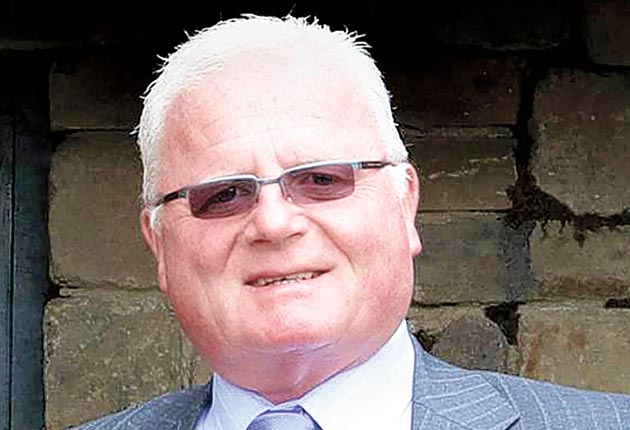Jimi Heselden: Miner who used his redundancy money to become a businessman and philanthropist

Your support helps us to tell the story
From reproductive rights to climate change to Big Tech, The Independent is on the ground when the story is developing. Whether it's investigating the financials of Elon Musk's pro-Trump PAC or producing our latest documentary, 'The A Word', which shines a light on the American women fighting for reproductive rights, we know how important it is to parse out the facts from the messaging.
At such a critical moment in US history, we need reporters on the ground. Your donation allows us to keep sending journalists to speak to both sides of the story.
The Independent is trusted by Americans across the entire political spectrum. And unlike many other quality news outlets, we choose not to lock Americans out of our reporting and analysis with paywalls. We believe quality journalism should be available to everyone, paid for by those who can afford it.
Your support makes all the difference.Jimi Heselden, a former Yorkshire miner, was the owner of the upright-scooter manufacturer Segway Inc, and founded Hesco Bastion, a multi-million pound company and the world's leading manufacturer of protective structures used primarily by the military.
James Heselden's was a veritable rags-to-riches story. Born in 1948 in the deprived Leeds suburb of Halton Moor on a large council estate, he attended Osmondthorpe school. Heselden left school at 15 for a life as a labourer and miner in the local pits of Temple Newsam and Lofthouse, until he lost his job in the wave of pit closures and redundancies that followed the 1984 miners' strike.
Heselden put his knowledge of geology and soil science to good use and reinvented the medieval defence system of gabions – baskets filled with stones and packed together to create makeshift walls. He patented the "Bastion" and in 1989 used his redundancy money to set up Hesco Bastion Ltd to manufacture them. The modern-day version, the "Concertainer", is made up of large, prefabricated portable wire cages which are flat-packed so that they can be assembled anywhere at a moment's notice. A typical wall of Hesco Concertainer units – equivalent to about 1,500 sandbags – can be erected and filled by two men and a single common loader in 20 minutes. A similar sandbag construction would take 10 men seven hours to build.
Its original purpose was for erosion and flood control on beaches and marshes. However, it caught the eye of the Ministry of Defence, who realised that the Concertainers were more res-ilient than traditional sandbags against missiles and mortar attacks; they ordered 10km of the baskets as a replacement for sand-filled oil drums, and used them during the 1991 Gulf War. Since then, they have become standard military equipment for Nato as well as American and British forces. Between 1998 and 2003 the Pentagon bought more than £53m-worth of the flat-packed walls, which can be found throughout Iraq protecting tanks, helicopters and soldiers, as well as in Afghanistan and the Balkans.
Heselden's invention was an overnight success and catapulted him into the Sunday Times Rich List, which this year placed him 395th with an estimated personal fortune of £166m. Although he lived with his family on a big country estate near Boston Spa, Heselden never forgot his roots and believed in giving something back to the community. To that end, he set up the Leeds Community Foundation (LCF) with an initial sum of £10m in 2008, with a further £13m since, making it one of the largest private funds in Britain. The organisation helps disadvantaged youngsters, vulnerable elderly people and invests in health-improvement projects in the south and east of the city.
In addition, Hesco Bastion, whose HQ is a short walk from Heselden's childhood home, now has four sites in Leeds and provides jobs for hundreds of workers. The company's latest innovation is the R-House, a new style of temporary housing that provides shelter for up to eight people in the aftermath of disasters, and is currently being used in Haiti.
Somewhat media-shy, Heselden did not court personal publicity, seldom posing for pictures or giving interviews, but upon setting up the LCF he said: "I honestly believe people have a moral obligation to use their wealth to help others. There are a lot of families out there who are struggling and a lot of youngsters who have grown up without role models and who can't get jobs." He rewarded loyalty in his workforce, as demonstrated when, in 1999, Hesco won an order for UN forces in Kosovo and fulfilled it well within deadlines. He flew the 21 staff out to Benidorm in Spain for a holiday.
In 2008, Heselden, who was awarded an OBE in 2006, gave £1.5m to the Help for Heroes fund when he won a charity-auction bid for nine people to fly with the Red Arrows. His company also sponsored a recent armed-forces charity concert at Twickenham.
In December 2009, Heselden bought control of the US-based motorised scooter company, Segway, based in New Hampshire. The distinctive two-wheeled upright scooter,originally unveiled in the US in 2001, was heralded as the future of transportation, but its safety record had been called into question many times. This was dramatically illustrated in 2003 when George Bush was photographed leaping from a Segway after losing control. Heselden died when he was testing a cross-country version of the Segway around his estate at Thorp Arch near Boston Spa when he skidded off and down a 30ft drop into the River Wharfe.
Heselden once commented that "Life turned out pretty well for me", and as the tributes have shown, he was widely regarded as a remarkably selfless millionaire and philanthropist.
James William Heselden, entrepreneur: born Halton Moor, Leeds 27 March 1948; OBE 2006; twice married (three daughters, two sons); died Boston Spa, West Yorkshire 27 September 2010.
Join our commenting forum
Join thought-provoking conversations, follow other Independent readers and see their replies
Comments